#Restorative Justice in Latin America
Explore tagged Tumblr posts
Text
Zaid Mohammed Mahdawi, 26, was sentenced this week in federal court for defacing a monument in Washington, D.C., with pro-terrorist graffiti during last year’s Fourth of July celebrations. The vandalism included the words “Hamas is coming” and a red triangle symbol commonly used by extremist sympathizers to designate intended targets. The act raised security concerns in the nation’s capital, especially given the timing and the nature of the message.

Despite the seriousness of the offense, Mahdawi received a sentence of just 10 days in jail, followed by six months of supervised release, community service, and an order to pay $1,500 in restitution for the damage. Prosecutors had sought a stiffer penalty, arguing that the act was not just vandalism but a veiled threat meant to instill fear and potentially signal future violence.
The case was presided over by U.S. District Judge James Boasberg, a judge who has drawn attention in the past for high-profile and controversial rulings. Boasberg previously made headlines when he blocked a Trump administration deportation flight to El Salvador—despite reports that the flight included members of the notorious Venezuelan-linked Tren de Aragua gang, known for violent crime and human trafficking across Latin America. The same judge is currently considering whether to hold government attorneys in contempt in another unrelated legal matter.
Critics of the sentence have voiced frustration over what they see as a lenient outcome for a case that involved a clear political message with potentially dangerous implications. “If someone painted a threat linked to a white supremacist group, I doubt the sentence would be this light,” one D.C. resident remarked. “There seems to be a double standard when it comes to how different types of extremism are treated.”
While Mahdawi did not contest the charges, no formal terrorism-related charges were filed. Authorities have not confirmed whether he is being investigated further or monitored for any ties to extremist groups.
The defaced monument has since been restored, but the incident has left lingering questions about security, radicalization, and the consistent enforcement of justice in politically sensitive cases.
17 notes
·
View notes
Text
According to the screenshots provided by [German researcher & historian Henrik Schönemann], the list includes (all of the following are direct quotes):
$78,000 to Palestinian activist group whose chairman was photographed attending an anniversary event celebrating the founding of the Popular Front for the Liberation of the Palestine terrorist group
$1 Million for foreign DEI programs, including ‘indigenous language technology’ in Guatemala, per non-public funding docs reviewed by WFB
$5 million for effort to treat eating disorders by “affirming” LGBTQIA+ patients’ sexual orientation and gender claims
Up to $3 million to defund the police advocacy group to pursue “climate justice” for convicts
Funded performances of play “Angels in America: A Gay Fantasia on National Themes,” in which God is bisexual and communists are good, in North Macedonia
Disbursed $15,000 to “queer” Muslim writers in India
Shelled out tens of thousands to create army of 2,500 LGBTQI+ allies
Up to $10 million worth of USAID-funded meals went to al Qaeda-linked terrorist group the Nusra Front
$500,000 to group that “empowers women” in attempt to solve sectarian violence in Israel just ten days before Hamas’ Oct. 7 attacks
$4.67 million to EcoHealth Alliance – one of the key NGOs funding bat virus research at Wuhan Institute of Virology — in late 2021. Later refused to answer key questions about the funding.
$7.9 million to a project that would teach Sri Lankan journalists to avoid “binary-gendered language”
$1.3 million to Arab and Jewish photographers
$1.5 million for “art for inclusion of people with disabilities”
$2 million to promote “LGBT equality through entrepreneurship…in developing Latin American countries.”
Education Week: “Biden Administration Cites 1619 Project as Inspiration in History Grant Proposal”
VA took at least a dozen actions aimed at bolstering DEI during the Biden-Harris administration while the number of homeless veterans increased and the amount of claims in the VA’s backlog grew from ~211,000 to ~378,000
NASA has allocated roughly $10 million to grants advancing DEI and “environmental justice” since 2020
Following President Trump’s executive order on DEI at federal agencies, the ATF “quietly changing the job title of its former diversity officer… to ‘senior executive’ with the ATF.
The Department of Labor requested additional funding in 2023 for “The Chief Evaluation Office for a new rigorous interagency evaluation of actions aimed at improving Diversity, Equity, Inclusivity, and Accessibility across the federal workforce,” more than $6.5 million “to restore employee benefits programs that will advance equity by specifically addressing how opportunities can be expanded for underserved communities and vulnerable populations,” and $5 million “to evaluate actions aimed at improving diversity, equity, inclusion, and accessibility (DEIA) within the federal workforce.”
Fox Business: “FOX Business’ ‘Trouble in the Skies,’ a six month investigation of the FAA’s new hiring practices, uncovered changes that may put the nation’s flying public at risk as well as allegations that the newest air traffic control recruits had access to answers on a key test that helped them gain jobs with the FAA…Also uncovered was an FAA effort to promote diversity that discarded 3000 qualified college graduates with degrees in air traffic control despite their following FAA procedure and obtaining FAA accredited degrees.”
Schönemann told 404 Media he wanted to share a sentiment alongside his find: “People all around the world care, you are not alone. And: #TransRights.”
Earlier this week, we reported that the Trump administration had set up a website called waste.gov, which was live on the internet with a sample page from a default WordPress template. Both DEI.gov and waste.gov were created at the same time, according to Reuters, and DEI.gov was recently set up to redirect to waste.gov. After our reporting, both websites were put behind a password wall.
#I just decided to paste the substance of the article here since clicking through is difficult + it wants you to sign up for an email list#but its um.... well you see why i think it is worth reading
11 notes
·
View notes
Text
On Lowering the Age of Criminal Responsibility in Argentina:
This Isn’t Justice, It’s Political PunishmentI feel like I’ve said this before. But seeing how the debate around lowering the age of criminal responsibility is still alive in my country, I have no choice but to speak up again. And this time, I’m angry. Because honestly, it’s exhausting. Watching how social pain is manipulated to push a punitive agenda that solves nothing.
Right now, in Argentina, the age of criminal responsibility is 16. And they want to lower it.
Do people seriously believe this will reduce crime? Do they truly think that putting 12- or 13-year-olds in prison will make our society safer? That’s not justice. That’s institutionalized stigma. That’s exclusion at an even earlier age.
Do we even realize what our prisons are like in Argentina? In Latin America in general? They’re places where violence multiplies. These are not spaces of rehabilitation — they are factories of marginalization. And I’m not just talking about violence among inmates. I'm talking about systemic abuse from prison staff too. Even juvenile detention centers are marked by neglect, repression, and trauma.
Sending a minor to prison is condemning them to a life even more marginal than the one that led them to commit a crime in the first place. A criminal trial leaves a mark. Society pre-judges you. Employers reject you. Relationships fall apart. Reintegration becomes an uphill battle. In the end, you’re just thrown back into a reality that’s even more hostile than before.
I understand the anger. It’s valid. Insecurity is real, and it hurts. But that anger is being used. The media and politicians feed on it, exploit it, and turn it into political fuel. But not to protect us — to reinforce a system that always targets the same people: the poor, the excluded, the disposable. Prisons are full of them.
Eugenio Zaffaroni, a great Argentine jurist, saw this clearly: criminal law doesn’t solve conflicts, doesn’t restore, doesn’t repair. It instrumentalizes. Both the victim and the accused.
The penal system, as it stands, is not about justice. It’s about control.
And when it comes to kids and teenagers, that control becomes even crueler.
Behind juvenile crime, there is abandonment, exclusion, lack of opportunity, a broken education system, hunger, rage.
This isn’t about justifying crime. It’s about understanding the context. About building real solutions. Not prisons.
#Argentina#law student#criminal law#prison reform#Edad de inputabilidad#Derecho penal#Law and control#Poder punitivo#control social#criminalization#criminalization of poverty
4 notes
·
View notes
Text
Update makes X available again to many in Brazil

Social media platform X became accessible to many users in Brazil on Wednesday as an update to its communications network circumvented a block order by the country's Supreme Court.
Last month, after a months-long dispute between X owner Elon Musk and Brazilian Justice Alexandre de Moraes, the Supreme Court had ordered Brazil's mobile and internet service providers to block the platform and users were cut off within hours.
But Brazilians flooded back onto the platform on Wednesday, with some cheering what they called a maneuver by Musk to flaunt the law.
But X later said that a switch in network providers had resulted in "an inadvertent and temporary service restoration" for Brazilian users.
X's Global Affairs team, in a post to the social media platform, said the switch had been spurred by the shutdown, as it meant certain infrastructure for the rest of Latin America was no longer accessible.
Continue reading.
5 notes
·
View notes
Text
✨ RUSSIAN COMMONWEALTH FOREIGN POLICY AGENDA ✨
The planet is still planet to bomb Russia back to the stone age. This fast track to full weaponization and war time economies will cripple the planet's ability to feed, clothe, medicate, and educate the human race for decades. All Russian Armed Forces must unconditionally withdraw from al theaters and return home in order to begin reassimilation, abandoning all conquered territories. The RC will fund rebuilding and remediation on both sides of the border with Ukraine and other occuppied territories. These stages of withdrawal are urgent as dissipation of the Heat Belt is a planet wide priority.
"Common Wealth, Common Peace" — A Foreign Policy Vision for a Post-War Planet
🕊️ THE MISSION
To lead a peaceful, inclusive, and regenerative era of international cooperation. We trade, not conquer. We build, not bomb. We serve people, not profit. 🌍
“Trade Over Tyranny. Peace Over Power. People Over Profit.”
🌐 PILLARS OF THE FOREIGN POLICY
1️⃣ SOCIALIZING THE COMMONWEALTH VISION
🎥 Global storytelling through media, film, and cultural exchange.
🎨 Art, language, and education campaigns to promote diversity + unity.
🌍 Annual Global Forum on Healing & Peace hosted by the Commonwealth.
📱 Digital diplomacy that highlights real people, not just politicians.
We’re not building an empire. We’re building a family of nations.
2️⃣ PREFERRED TRADING AGREEMENTS (PTAs) FOR PEACE
✨ Reduced tariffs for peacetime goods (education, health, green tech).
🤝 Tech-sharing, infrastructure co-building, and peace credits.
⚖️ No weapons manufacturing required to join our economic zones.
💸 Shared profits + labor protections baked into every agreement.
If it costs lives, we don’t sell it. If it builds futures, we trade it.
3️⃣ PEACE INDUSTRY ZONES
🛠️ From war zones to workshop floors. We’re converting conflict economies into:
🏥 Health tech and education manufacturing hubs
🌿 Clean energy and agriculture zones
👩🏾🏭 Jobs for ex-soldiers, women, and displaced communities
4️⃣ STRATEGIC NON-MILITARY ALLIANCES
🌍 Partnership with Africa, Latin America, Southeast Asia, Indigenous nations.
🏛️ Commonwealth Development Banks with local equity + returns.
🌱 Embassy of the Earth: Diplomacy through eco-justice.
🛠️ Peace Engineer Corps: Like Peace Corps, but rebuilding instead of observing.
Allies without arms. Peace without pretense.
💔 HEALING A PLANET ADDICTED TO WAR
🕊️ Restorative Trade Program: Duty-free exports for war-recovery nations.
💬 Reparations Dialogue Tables: Talking equity, not guilt.
📊 Royal Commission on Post-War Economies: Tracking healing globally.
📣 MESSAGING ANCHORS
“We build, we don’t bomb.” Anti-war. Pro-infrastructure. Pro-human.
“Common wealth is shared wealth.” Wealth should flow—not hoard.
“No more kingdoms of poverty.” We are done extracting. It’s time to invest.
“Trade like lives depend on it—because they do.” Because they do.
🌟 The Russian Commonwealth is here to make peace profitable, and war obsolete. 🌐 Follow, share, build with us. This is the next chapter of global history—and you're invited.
This is HOW, but this...is why:
#foreignpolicy #russiancommonwealth #anticolonial #peaceeconomy #ethicaltrade #futureforward #indigenousrights #greennewworld #softpower #globalhealing
0 notes
Text
Loving the Brine Shrimp: Exploring Queer Feminist Blue Posthumanities to Reimagine the ‘America’s Dead Sea’

In the pantheon of academic absurdity, there are works that boggle the mind and shake one’s faith in higher education. “Loving the Brine Shrimp: Exploring Queer Feminist Blue Posthumanities to Reimagine ‘America’s Dead Sea’” is just such a paper. Reading this treatise on the intersection of brine shrimp, queer theory, and “hydrosexuality” is like stepping into a postmodern fever dream—a world where actual problems like water scarcity play second fiddle to debating the eroticism of aquatic ecosystems. Buckle up; this is going to be a salty ride.
The article aims to transform narratives surrounding Utah’s Great Salt Lake, often referred to as “America’s Dead Sea,” by reimagining how brine shrimp (Artemia franciscana) are perceived in science, culture, and art. It introduces the concept of hydrosexuality to bridge these realms, thereby enriching feminist blue posthumanities and feminist biology through art-based practices and queer advocacy. By navigating the environmental narrative of the GSL, the hydrosexual perspective challenges settler science by exploring the connections between the reproductive system of brine shrimp and the economy, ecology and culture. The article provides a framework for integrative cultural analysis that bolsters arguments about the multilayered exploitation of the lake and amplifies voices that recognize the brine shrimp as vital to the survival of multiple species and to the GSL as a unique ecosystem. Furthermore, this cultural analysis draws inspiration from low trophic theory and Queer Death Studies. This multifaceted approach is exemplified by two case studies in the arts, which gradually alter white humans’ perceptions and understandings of the brine shrimp, helping to reimagine the GSL in the context of rapid climate change. https://link.springer.com/article/10.1007/s10806-024-09934-0
“Hydrosexuality”—Yes, It’s a Thing
This is a love story that aims to change narratives about the Great Salt Lake through how people imagine brine shrimp in science, culture and art. It explores the concept of hydrosexuality to mediate between these realms, enhancing feminist blue posthumanities and feminist biology with the art-based practices of queer advocacy you might not have heard of before. https://link.springer.com/article/10.1007/s10806-024-09934-0
Apparently, the Great Salt Lake’s iconic brine shrimp are not just extremophile crustaceans but are also subjects of philosophical contemplation. The author coins the term “hydrosexuality,” a bold new concept bridging the worlds of “feminist blue posthumanities” and “queer advocacy.” This involves imagining water as a “non-binary substance” connecting life across planetary ecosystems. Admirable? Perhaps. Comical? Most definitely.
The idea of being “hydrosexual” raises questions. Is this a critique of human hubris, or just an academic prank that got way out of hand? This so-called “hydrosexual position” appears to be a rhetorical device to argue that water, brine shrimp, and environmental justice are best understood through the lens of erotic fluidity. Because nothing says ecological advocacy like imagining brine shrimp in sexually charged metaphors.
Critiquing “Settler Science”
The paper takes aim at “settler science,” branding traditional ecological and biological studies as products of colonialism. The claim that naming brine shrimp Artemia franciscana is somehow part of a “biology of empire” feels like an Olympic-level stretch. Sure, let’s just ignore the practical need for Latin taxonomy in favor of a narrative that blames crustacean nomenclature on imperialism.
According to the author, the Great Salt Lake has been wronged by both settler colonialists and capitalist industries. Fair enough. But the solution offered is not focused on policy, conservation, or restoration. No, the answer apparently lies in embracing “queer blue posthumanities” and asking, “How can we make people fall in love with brine shrimp?” I wish I were kidding.
The “Marriage” of Humans and Brine Shrimp
Yes, you read that right. In one of the most bizarre moments in academic history, the author discusses an art performance called the “Cyber Wedding to the Brine Shrimp.” This ceremony involved vows made to the tiny crustaceans, followed by a procession through the Great Salt Lake’s dried-up lakebed, and a communal bath that was poetically described as “making love to the lake.”
Who needs practical environmental activism when you can marry a shrimp? This performance is supposed to challenge the exploitative relationship humans have with nature. But it feels less like meaningful advocacy and more like a caricature of academic performance art.
Sea-Monkeys and the Fall of Civilization
The author reserves special disdain for Harold von Braunhut, the inventor of the iconic “Sea-Monkeys.” The whimsical marketing of brine shrimp to children is characterized as part of a sinister colonial-capitalist agenda. Apparently, turning brine shrimp into toys for kids was an act of ecological violence disguised as family-friendly fun. Because heaven forbid children marvel at tiny aquatic creatures without pondering the environmental implications.
This product has been sold children in the U.S. and globally since the end of the 1960s by Harold von Braunhut, a mail-order marketer, inventor, and White supremacist (Brott, 2000). Working in collaboration with a scientific consultant, marine biologist Anthony D’Agostino, he obtained a patent for selling brine shrimp cysts that “come to life” upon the addition of water, salt, and chemically formulated nutrition. What had already been cheap fish food was also transformed into an illusion of vitality incubated in a small plastic tank included in the product package. Drawing from perspectives offered by queer death studies (Radomska et al. 2021, p. 2), the brine shrimp’s ambiguous status and reproductive agentiality, hovering between the “living” and “non-living” in a state scientifically referred to as cryptobiosis, were reinvented for entertainment, concealing environmental violence. I argue that the distribution of this example of bio-fiction pet amplified the brine shrimp characteristic as critters undeserving of empathy.
A Salty Conclusion
This paper is less about saving the Great Salt Lake and more about using the lake as a platform for self-indulgent theorizing. The environmental crisis it describes—the shrinking of the lake due to water diversion—is real, despite the knee-jerk blame directed at climate change. But instead of proposing practical solutions, the study disappears into a whirlpool of jargon-heavy metaphysics and half-baked social critiques.
The Great Salt Lake doesn’t need a “hydrosexual critique” or an avant-garde shrimp wedding. It needs real science, real conservation efforts, and real policies to preserve its fragile ecosystem. This paper, while colorful, is an example of what happens when academic naval-gazing substitutes for actionable ideas.
In the immortal words of the brine shrimp: Please stop.
0 notes
Text



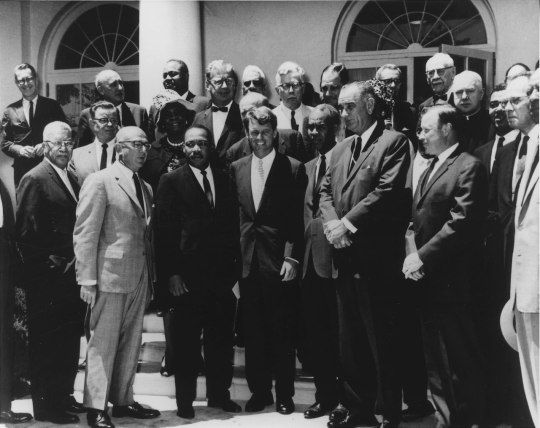
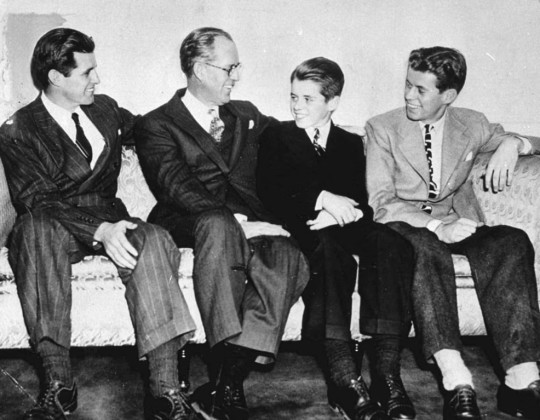

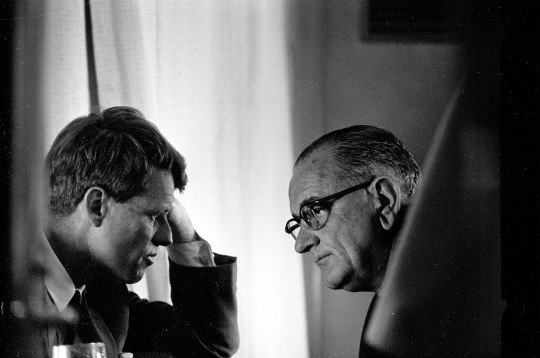

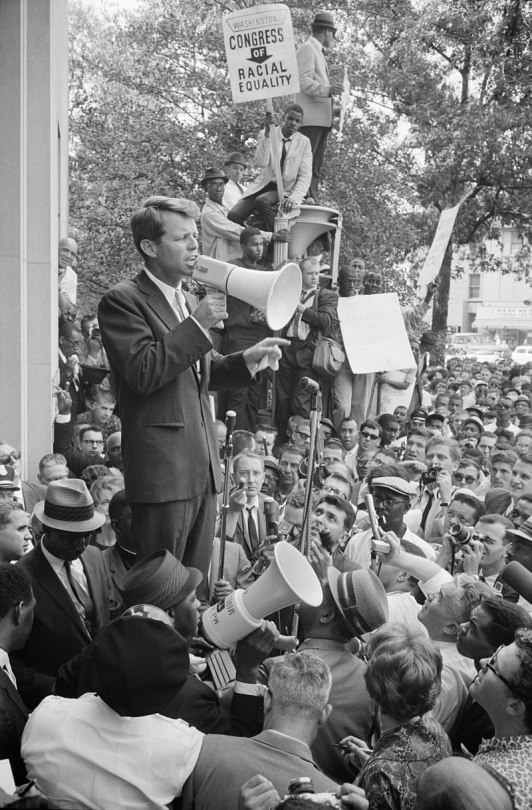

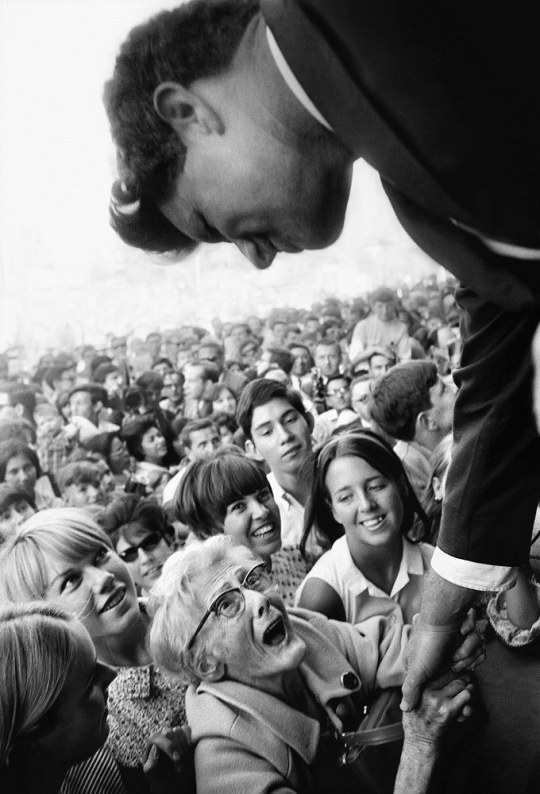
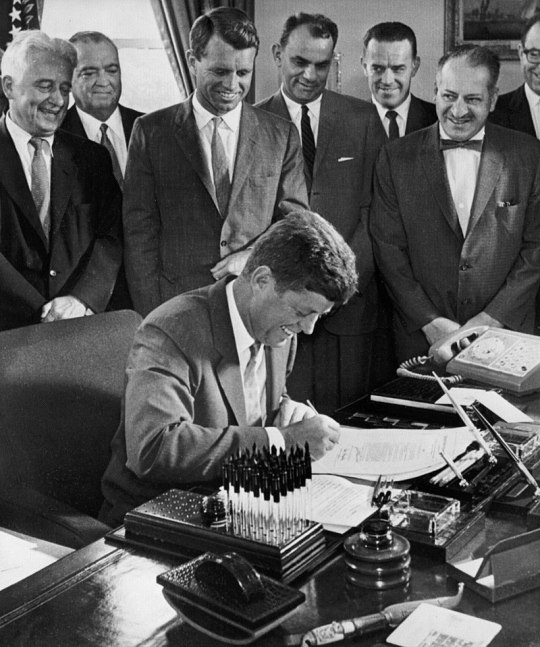
Arrivals & Departures . 20 November 1925 – 06 June 1968 . Robert Francis Kennedy
Robert Francis Kennedy, also known by his initials RFK, was an American politician and lawyer. He served as the 64th United States attorney general from January 1961 to September 1964, and as a U.S. senator from New York from January 1965 until his assassination in June 1968, when he was running for the Democratic presidential nomination. Like his brothers John F. Kennedy and Ted Kennedy, he was a prominent member of the Democratic Party and is considered an icon of modern American liberalism.
Born into the prominent Kennedy family in Brookline, Massachusetts, Kennedy attended Harvard University, and later received his law degree from the University of Virginia. He began his career as a correspondent for The Boston Post and as a lawyer at the Justice Department, but later resigned to manage his brother John's successful campaign for the U.S. Senate in 1952. The following year, Kennedy worked as an assistant counsel to the Senate committee chaired by Senator Joseph McCarthy. He gained national attention as the chief counsel of the Senate Labor Rackets Committee from 1957 to 1959, where he publicly challenged Teamsters President Jimmy Hoffa over the union's corrupt practices. Kennedy resigned from the committee to conduct his brother's successful campaign in the 1960 presidential election. He was appointed United States attorney general at the age of 35, one of the youngest cabinet members in American history. Kennedy served as John's closest advisor until the latter's assassination in 1963.
Kennedy's tenure is known for advocating for the civil rights movement, the fight against organized crime, and involvement in U.S. foreign policy related to Cuba. He authored his account of the Cuban Missile Crisis in a book titled Thirteen Days. As attorney general, Kennedy authorized the Federal Bureau of Investigation (FBI) to wiretap Martin Luther King Jr. and the Southern Christian Leadership Conference on a limited basis. After his brother's assassination, he remained in office during the presidency of Lyndon B. Johnson for several months. He left to run for the U.S. Senate from New York in 1964 and defeated Republican incumbent Kenneth Keating, overcoming criticism that he was a "carpetbagger" from Massachusetts. In office, Kennedy opposed U.S. involvement in the Vietnam War and raised awareness of poverty by sponsoring legislation designed to lure private business to blighted communities (i.e., Bedford Stuyvesant Restoration project). He was an advocate for issues related to human rights and social justice by traveling abroad to eastern Europe, Latin America, and South Africa, and formed working relationships with Martin Luther King Jr., Cesar Chavez, and Walter Reuther.
In 1968, Kennedy became a leading candidate for the Democratic nomination for the presidency by appealing to poor, African American, Hispanic, Catholic, and young voters. His main challenger in the race was Senator Eugene McCarthy. Shortly after winning the California primary around midnight on June 5, 1968, Kennedy was shot by Sirhan Sirhan, a 24-year-old Palestinian, allegedly in retaliation for his support of Israel following the 1967 Six-Day War. Kennedy died 25 hours later. Sirhan was arrested, tried, and convicted, though Kennedy's assassination, like his brother's, continues to be the subject of widespread analysis and numerous conspiracy theories.
1 note
·
View note
Text
"..No war in our nation’s history has ever been so violative of our conscience, our national interest and so destructive of our moral standing before the world. No enemy has ever been able to cause such damage to us as we inflict upon ourselves.
The inexorable decay of our urban centers has flared into terrifying domestic conflict as the pursuit of foreign war absorbs our wealth and energy. Squalor and poverty scar our cities as our military might destroy cities in a far-off land to support oligarchy, to intervene in domestic conflict. The President who cherishes consensus for peace has intensified the war in answer to a cry to stop the war. It has brought tauntingly to one minute’s flying time from China to a moment before the midnight of world conflagration. We are offered a tax for war instead of a plan for peace. Men of reason should no longer debate the merits of war or means of financing war. They should end the war and restore sanity and humanity to American policy. And if the will of the people continues to be unheeded, all men of good will must create a situation in which the 1967- 68 are made a referendum on the War. The American people must have an opportunity to vote into oblivion those who cannot detach themselves from militarism, and those that lead us.
So we are here because we believe, we hope, we pray that something new might emerge in the political life of this nation which will produce a new man, new structures and institutions and a new life for mankind. I am convinced that this new life will not emerge until our nation undergoes a radical revolution of values. When machines and computers, profit motives and property rights are considered more important than people the giant triplets of racism, economic exploitation and militarism are incapable of being conquered. A civilization can flounder as readily in the face of moral bankruptcy as it can through financial bankruptcy.
A true revolution of values will soon cause us to question the fairness and justice of many of our past and present policies. We are called to play the Good Samaritan on life’s roadside, but that will only be an initial act.
One day the whole Jericho Road must be transformed so that men and women will not be beaten and robbed as they make their journey through life. True compassion is more than flinging a coin to a beggar, it understands that an edifice which produces beggars, needs restructuring.
A true revolution of values will soon look uneasily on the glaring contrast of poverty and wealth, with righteous indignation it will look at thousands of working people displaced from their jobs, with reduced incomes as a result of automation while the profits of the employers remain intact and say, this is not just.
It will look across the ocean and see individual Capitalists of the West investing huge sums of money in Asia and Africa only to take the profits out with no concern for the social betterment of the countries and say, this is not just.
It will look at our alliance with the landed gentry of Latin America and say, this is not just.
A true revolution of values will lay hands on the world order and say of war, this way of settling differences is not just.
This business of burning human being with napalm, of filling our nation’s home with orphans and widows, of injecting poisonous drugs of hate into the veins of peoples normally humane, of sending men home from dark and bloodied battlefields physically handicapped and psychologically deranged cannot be reconciled with wisdom, justice and love.
A nation that continues year after year, to spend more money on military defense then on programs of social uplift is approaching spiritual death.
So what we must all see is that these are revolutionary times All over the globe, men are revolting against old systems of exploitation and out of the wombs of a frail world, new systems of justice and equality are being born. The shirtless and barefoot of the Earth are rising up as never before. The people who sat in darkness have seen a great light. We in the west must support these revolutions. It is a sad fact that because of comfort, complacency, a morbid fear of Communism and our proneness to adjust to injustice, the Western nations that initiated so much of the revolutionary spirit of the modern world have now become the arch anti-revolutionaries.
This has driven many to feel that only Marxism has the revolutionary spirit. In a sense, Communism is a judgment of our failure to make democracy real and to follow through on the revolutions that we initiated. Our only hope today lies in our ability to recapture the revolutionary spirit and go out into a sometimes hostile world, declaring eternal opposition to poverty, racism and militarism. With this powerful commitment, we shall boldly challenge the status quo and unjust mores and thereby speed the day when every valley shall be exalted and every mountain and hill shall be made low and the crooked places shall be made straight and the rough places plain.
May I say in conclusion that there is a need now, more than ever before, for men and women in our nation to be creatively maladjusted. Mr. Davis said, and I say to you that I choose to be among the maladjusted, as my good friend Bill Coffin said there are those who have criticized me and many of you for taking a stand against the War in Vietnam and for seeking to say to the nation that the issues of Civil Rights cannot be separated from the issues of peace.
I want to say to you tonight that I intend to keep these issues mixed because they are mixed. Somewhere we must see that justice is indivisible, injustice anywhere is a threat to justice everywhere and I have fought too long and too hard against segregated public accommodations to end up at this point in my life, segregating my moral concerns.
So let us stand in this convention knowing that on some positions; cowardice asks the questions, is it safe; expediency asks the question, is it politic; vanity asks the question, is it popular, but conscious asks the question, is it right. And on some positions, it is necessary for the moral individual to take a stand that is neither safe, nor politic nor popular; but he must do it because it is right. And we say to our nation tonight, we say to our Government, we even say to our FBI, we will not be harassed, we will not make a butchery of our conscience, we will not be intimidated and we will be heard."
0 notes
Text
Andreas Umland: Should Kyiv be pressured to exchange land for peace?

Both Kyiv and the West want a full and stable truce with Moscow – sooner rather than later.
Why and how Ukrainian national interest currently contradicts a ceasefire with Russia is clear: Kyiv’s problem in negotiating with Moscow is that an agreement with the Kremlin now will not lead to the full restoration of Ukraine’s territorial integrity. It will also not protect Ukraine from continuing Russian imperialism and anti-Ukrainianism.
According to most Ukrainians and other Eastern Europeans, talking to the current Russian government about accommodation is a waste of time. Only after a crushing defeat of Russia is a lasting condominium between Moscow and Kyiv feasible. As in earlier periods of Tsarist and Soviet history, a military disaster may trigger fundamental domestic change in Russia.
Western countries, as well as other states across the globe, face a different dilemma.
They may be more equivocal toward Putin’s idiosyncrasies, Russia’s future, and Ukraine’s sovereignty. Western capitals may worry far less than Kyiv about the long-term prospects of a ceasefire or peace agreement. Electoral cycles in democratic states suggest to politicians in pursuit of public offices to look for quick solutions today rather than engaging in multi-year stand-offs.
Andreas Umland: Why Russia and Ukraine will not find a compromise soon
Editor’s Note: This article is based on a series of four reports currently produced by the Stockholm Centre for Eastern European Studies (SCEEUS) at the Swedish Institute of International Affairs. The opinions expressed in the op-ed section are those of the authors and do not purport to reflect the

The Kyiv IndependentAndreas Umland

The cynics' challenge
Many in Washington, Brussels, Paris, or Berlin – not to mention capitals in Asia, Africa, or Latin America – may view Russia’s war against Ukraine as a far-away regional, post-Soviet, and/or Slavic dispute. Some politicians continue to argue openly that this Eastern European confrontation is of little concern to them.
Ukraine is geographically, culturally, historically, and politically remote from most Western actors’ homelands. That could be seen to imply for their governments that financial, military, and political investment in Ukraine’s defense, security, and recovery should be limited or even discontinued. It could also be seen to mean that a bad but soon peace now is preferable to a noble but long military confrontation.
Even politicians and governments unconcerned about justice, freedom, and self-determination cannot separate, however, their behavior vis-à-vis Moscow and Kyiv from issues of global stability and security. Ukraine is – like Russia – part and parcel of the world’s political and legal order. It constitutes a full member of the international community of states.
Already in 1945-91, the Ukrainian Soviet republic was, unlike the Russian Soviet republic, a non-sovereign participant of the United Nations.
Ukraine became, after gaining independence in August 1991, not only a regular member of the UN as a fully sovereign state. It is today also an orderly participant of the Council of Europe, OSCE, and Nuclear Non-Proliferation Treaty, as well as many other international organizations, regulations, and agreements.
youtube
The Kremlin’s gauntlet
For this reason, Russia has, already with its illegal annexation of Ukraine’s Crimean Peninsula in 2014, created a fundamental problem for the international community of states – including those governments caring little for the fate of the Ukrainian people and state.
Moscow insists that the Ukrainian nation and state have no full value. The structure, logic, and functioning of international order, trans-border cooperation, and the security system suppose, however, that it does.
Eight years after its armed capture of Crimea, Moscow doubled down on its denial of Ukrainian statehood. Again illegally and even more unashamedly, Russia annexed yet four more regions, now in Ukraine’s southeastern mainland.
This additional demonstrative violation of international law, as well as Moscow’s escalating terror campaign against Ukraine’s civilians since Feb. 24, 2022, have increased the stakes. The war’s course, duration, outcome, and repercussions have become ever more fateful not only for Ukraine, but also for the solidity of the planet’s order of sovereign states.
Nine years ago, the Kremlin’s story about the allegedly disputed status of Crimea was partly bought by the international community. Today, in contrast, only a few politicians, diplomats, and experts would any longer accept the Kremlin’s odious justifications for Russia’s outrageous behavior in Ukraine.
The Kremlin still provides putative explanations as to why Ukraine does not have the right to exist, at least not in its internationally recognized borders. Moscow continues its selective presentation and plain falsification of Ukrainian history, law, politics, culture, etc. All of this is meant to substantiate the Kremlin’s claim that Ukraine is “not really a thing.”
Pelechaty, Robertson: Decoding Russian disinformation campaigns
“Valerii Zaluzhnyi, the commander-in-chief of Ukraine’s Armed Forces, is dead.” Such was the false message spread by Russia’s propaganda machine in early May – even Wagner Group head Yevgeny Prigozhin joined in. Kyiv was quick to dispel the claim as an intentional effort to “demoralize Ukrainian f…

The Kyiv IndependentTeah Pelechaty
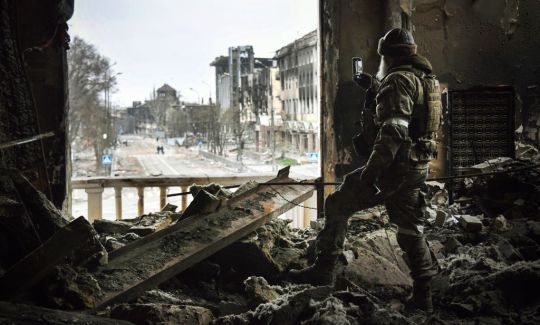
International order, adieu?
The problem of the Kremlin’s disinformation campaign is not only and not so much its factual inaccuracies and cherry-picking of events in Ukrainian history. Moscow’s more fundamental challenge with its narrative about Ukraine is that rhetorically similar stories could be told about many countries.
Most states and territories across the globe had confusing histories, contradictory allegiances, and odd episodes during their ancient and recent pasts. Some have until today disputed territories and ambivalent identities. All countries of the world did, like Ukraine, not exist at one time. They were all once not real nations, and had, like Ukraine, different borders.
In spite of the explosiveness of Moscow’s behavior for the international system of states, the Kremlin insists that Pandora’s Box is empty. Worse, Russia is, in doing so, not just any country in the post-Cold War world. It has inherited from the Soviet Union a permanent seat in the United Nations Security Council (UNSC), and the status as an official nuclear-weapon state under the Non-Proliferation Treaty (NPT).
The Russian Federation is one of those five members of the community of peoples which have special rights and responsibility for upholding the order of states, world security, and international law. With its actions, Moscow is undermining the most fundamental principles of the UN Charter.
Russia is turning the logic of the worldwide regime to prevent the spread of atomic arms and the exceptional status of the five official nuclear-weapon states on its head. The UNSC and NPT have, in Russia’s hands, become instruments not of stabilizing but of undermining the international order.
Richard Cashman: Understanding Russia’s imperial conceits
Understanding Russia’s February 2022 full-scale invasion of Ukraine as part of an imperial war begun in 2014 has become increasingly commonplace in Euro-Atlantic foreign policy-making circles and amongst a wider group of countries concerned with ending the war. Yet the full range of imperial conceit…

The Kyiv IndependentRichard Cashman

Nevertheless, peace now?
Most self-proclaimed pragmatists and pacificists who argue for a land-for-peace deal are not on the payroll of the Kremlin. They may have little sympathy for Putin & Co. Some express empathy for Ukraine and its people. Their ceasefire and peace proposals are drawn in the belief that they correspond to the assumed real interests of the Ukrainian people.
Yet, the supposed pragmatists seem to be unwilling or unable to consider all consequences of their pacifist plans.
First, a land-for-peace deal with Moscow begs the question of what kind of truce in eastern and southern Ukraine this can lead to. The local population in Ukraine’s Russian-occupied territories has been exposed to deportations, torture, executions, expropriations, and other human rights violations. Many of the ceasefire advocates are prone to moralistic argumentation. They typically avoid, however, the fundamental ethical issue of prolonging Russia’s terroristic occupation regime in parts of Ukraine.
Second, the various peace plans either ex- or implicitly foresee a temporary or even permanent limitation of Ukraine’s territorial integrity or/and political sovereignty. Among the most popular proposals are leaving Crimea under Moscow’s control or/and excluding Ukraine’s NATO accession. This would, however, create a problem not only for Ukraine. It would also send an ambivalent global signal.
Following such a path to peace implies that the territory, freedom, and independence of a full UN member would be constrained not only by Russia. An internationally promoted compromise would mean that other countries too become complicit in subverting the international order.
This course of action would repeat France’s and Germany’s dubious pressure on Ukraine within the infamous “Normandy Format” of 2014-21. After using large-scale military violence and nuclear blackmail, Russia would again be officially allowed and supported, by a multilateral group, to harvest the fruits of its aggression.
youtube
Inconvenient questions
What authority and legitimacy will the UN system and European security order have if Russia gets away with violating dozens of bi- and multilateral commitments it has taken upon itself in various international treaties and organizations?
If a larger community of states promotes and accepts a deal resulting in net gains for Russia, this would not only fail to respect Ukraine’s political sovereignty and territorial integrity. It would also contradict these countries’ obligations, according to international law, not to legitimize the spoils of military conquest.
Even a partial satisfaction of Moscow’s political and territorial demands may send a message to certain countries around the world that may try to be as “smart” as Russia. Why should other relatively powerful countries in different parts of the world not attempt, with some semi-plausible apology, to do things to their neighbors similar to those which Russia did to its southwestern “brother nation?” Aren’t other territories around the world not as disputed and as much waiting to be brought home as so-called “Novorossiia” or “New Russia” (i.e., Ukraine’s east and south)?
Worse, several or even many smaller nations around the world might want to make sure they do not end up in the shoes of the Ukrainians. Why would governments of relatively weak states across the world continue to rely on international law and organizations for the protection of their borders, territory, and independence?
If Western governments and other influential states signal that they cannot be counted on as defenders of the international order, perhaps, other instruments may be necessary for self-defense, such as chemical agents or nuclear warheads?
How controversial cluster munitions give Ukraine needed punch during counteroffensive
Ukraine has begun using American cluster munitions in the field and is doing so effectively, according to the White House. “They are using them appropriately,” National Security Spokesman John Kirby said on July 21. “They’re using them effectively, and they are actually having an impact on Russia’s…

The Kyiv IndependentIgor Kossov

Conclusions
The slow and half-hearted reaction of the international community to Russia’s illegal annexation of Crimea in 2014, hybrid war in the Donbas in 2014-2021, and large-scale invasion since Feb. 24, 2022, has already done damage to the international system. The implementation of a well-sounding peace plan may temporarily end the fighting in Ukraine today. Yet, it would further deepen the already worrisome cracks in the world order.
A multilaterally sponsored land-for-peace deal between Russia and Ukraine would acknowledge that might is right. This admission would derail not only the international liberal order, but world security and stability in general. It would do lasting damage to the worldwide regime for the non-proliferation of nuclear and other weapons of mass destruction.
The Russian armed aggression and genocidal campaign against the Ukrainian nation cannot be fully reversed with non-military means. There is thus no other way than to meet force by force. This is in full accordance with international law, in general, and the UN Charter’s Article 51, in particular.
Compromises, concessions, and other allowances to an aggressor state are no way toward a durable peace in Eastern Europe and elsewhere. A land-for-peace deal would do lasting damage to the rules-based international order and future rule of international law.
This article has been written within a larger SCEEUS project on hindrances to a Russian-Ukrainian truce. (See: https://sceeus.se/en/publications/)
Editor’s Note: The opinions expressed in the op-ed section are those of the authors and do not purport to reflect the views of the Kyiv Independent.
Submit an Opinion
0 notes
Text
And to their credit, the Handler class doesn't do the noble savage myth; They stand by and wait for the Useful Idiots do it, and then after the Useful Idiots have made their cheesy assed movies meant to emotionally appeal and manipulate others to their side, they decry said media as racist and the well meaning but misguided products of a still white supremacist but white guilty society.
The Handler class will still say Noble Savage is a myth, but they absolutely will attribute all existing historical activities of white people as singularly evil on the basis that they involved capitalism, and will attribute capitalism to whiteness, and both synonymous with moral evil, indivisible from one another.
Because the Handlers want people assembled against capitalism, and one of the ways in which they incentivize doing that is to paint a white man's face on it to go, "White people hurt you and your people, white people hurt you and your community, white peoples' activities singularly did wrong and caused the damage to the earth that are hurting your region of earth from global climate change. Help us fight against White Supremacy* and Capitalism to find justice and peace and restore the earth."
The Handler Class tries to omit discussion of anything but specifically the conversation which makes other groups of people into violated victims. As they implied white people barnstormed America just shooting hundreds of millions of aboriginal Americans, cutting off their ears to wear on necklaces, just committed aggressive genocides. When the reality is, Native Americans largely died from disease spread long before the English arrived and began colonizing the Eastern States.
They still attribute the Eastern States and the expansion westward to what did the majority of the genociding, and attribute that to the Western Europeans, when Hispanic America did a great deal of the genociding and miscegenating tribes out stuff. But they want Latin Hispanics synonymous with Native Americans and thus more legitimate to this continent than whites are, so politically they speak to them as if white people stole their land, or that people of tribes from south of the Texan border have more a claim to indigenousness just based on continental landmass than whites that've been here for 400+ years.
They talk about white colonialism as though it was singularly worse, either by individual cruelty or over a span of time, than when any other group of people did it to any other group of people on earth. When the Jainisaries of the Ottoman Turks did worse to the Greeks, for far longer. We don't dare speak of the Arab world with the same vitriol we do of white colonials in Georgia, despite the fact Caliphates have done far worse for far longer. Because the people badmouthing the white colonials want the romance of the big bad evil white person and an entire menagerie of wronged minority groups and them coming together to fight the Last Boss, bring on socialism and free the world of evil.
They don't do the Noble Savage myth, they just say everybody is a victim of the white man, whom is illegitimate as a man and only exists as a conspiracy of self-interest, does not deserve consideration as a bonafide demographic, and only still exists because of inertia, but they believe rightly shouldn't. Everybody on earth, so they think, has a vested interest in accepting this fantasy at face value and treating it as if it's true. Because it puts a white face on capitalism, and gives them a reason to organize and hate it.
That's why they put so much emphasis on white colonialism. It's narratively convenient.
Finally started reading Guns, Germs and Steel which is a book that has been on my list forever. Ironically, the recent (though not the first) backlash against it is what prompted me to pick it up.
Some of the criticisms of it might be valid; possibly geography is over-emphasized as a causal factor in the unequal outcomes of various societies, possibly there are other factors that don't get enough attention. But there's a particular brand of moral criticism that goes something like this quote from this article (https://www.insidehighered.com/news/2005/08/03/guns-germs-and-steel-reconsidered):
"This is a punchline about race and history that many white people want desperately to hear," she writes. "Those dying black kids at the end of the special -- we know, because We Are Not Racist, that they don’t deserve what they are getting. They are not inferior. In fact, there but for the grace of god…. And it poisonously whispers: mope about colonialism, slavery, capitalism, racism, and predatory neo-imperialism all you want, but these were/are nobody’s fault. This is a wicked cop-out."
One has only to read a few chapters of the book to know that it does not in any way attempt to gloss over the reality of violent conquest and its role in establishing Western dominance. There's no shortage of rat bastard white conquerors in these pages (though there are cameos of other, not-white conquerors behaving in similar ways). Nor does the book in any way attempt to deny the existence of colonialism or of ideologies designed to justify and reinforce material inequalities. What it does do is attempt to explain why Western societies were in a position to violently conquer other peoples, and the explanations have to do with the titular viruses and geography and a bunch of other factors that do in fact boil down to luck. That doesn't mean it was "nobody's fault." It was the fault of many people, in the sense that the people who did violent things still did those things. How you want to judge them for that is up to you, but most people, myself included, do regard violent conquest as a not-good thing that we should try to have less of in the future.
I'm left wondering...for people who say that this is a work of apologia for inequality, how exactly could the book have handled its subject matter in a way that would have satisfied them? By including a "this is bad behavior and we should condemn these people" footnote on every page that describes one society conquering another?
The basic objection here seems to be to the very fact that this is a science book and not a moral instruction manual about how to be anti-racist. Which I guess is not surprising. The power of explanation inherently tends to kind of take the piss out of morality and deflate its mystical-feeling notions of good and evil and moral duty, which is why science and morality (whether it be religious or secular) have butted heads throughout most of history.
114 notes
·
View notes
Text
Transforming Conflict: Grassroots Peace Initiatives in Latin America
by Emancip8 Project
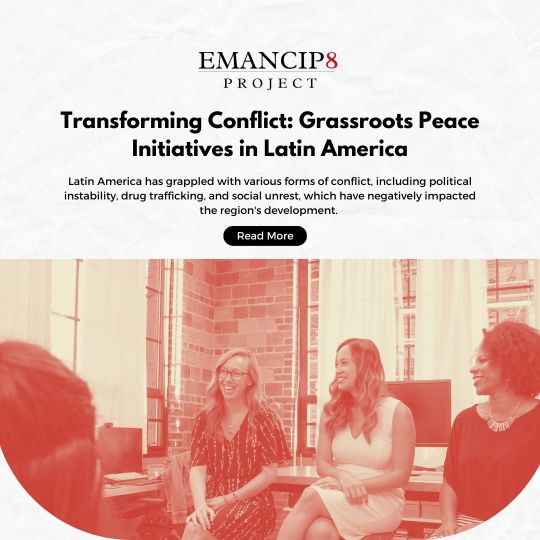
Latin America has grappled with various forms of conflict, including political instability, drug trafficking, and social unrest, which have negatively impacted the region’s development. Nonetheless, grassroots peace initiatives have emerged as powerful agents of change, providing local solutions to complex problems. This article explores the transformative impact of grassroots peace initiatives in Latin America and their potential to foster lasting peace in the region.
Community-based dialogue platforms play a crucial role in mitigating conflicts at the local level (Avritzer, 2002). By creating safe spaces for open dialogue and fostering trust among community members, these initiatives can address grievances, reconcile differences, and facilitate collective problem-solving. The Colombian experience, in particular, demonstrates the power of local dialogue platforms, where initiatives like the Community Councils for Peace have contributed to reducing violence in rural areas (Bouvier, 2016).
Another essential component of grassroots peace initiatives is the empowerment of women and their active participation in peace processes (Tripp, 2015). Women-led organizations, such as the Madres de Plaza de Mayo in Argentina, have been instrumental in advocating for human rights and holding perpetrators of violence accountable (Roniger & Sznajder, 1998). Additionally, the inclusion of women in peace negotiations and decision-making bodies can improve the durability and inclusiveness of peace agreements (O’Reilly, 2015).
Youth engagement is also critical for sustainable peace-building efforts, as young people are often disproportionately affected by conflict (Cortright & Wall, 2012). Youth-led organizations like the Colectivo Jóvenes Constructores in Mexico work towards providing alternative pathways for young people, steering them away from violence and crime by offering education, employment, and social inclusion opportunities (Freyermuth & Rueda, 2014).
Grassroots initiatives that focus on restorative justice can contribute to healing the wounds of past conflicts and fostering reconciliation within communities (Zehr, 2002). In Peru, the innovative theater-based project “Caja de Memorias” uses storytelling and performance to facilitate dialogue and understanding between victims and perpetrators of violence during the Shining Path insurgency (Milton, 2013).
Lastly, transnational networks and cooperation among grassroots peace initiatives can amplify their impact and foster regional peace (Rocha, 2011). The Central American Network for Peacebuilding (REPAZ) is one such example, as it connects civil society organizations from across the region to share experiences, resources, and best practices (REPAZ, 2018).
In conclusion, grassroots peace initiatives in Latin America hold the potential to transform conflict by fostering dialogue, empowering women and youth, promoting restorative justice, and establishing transnational networks. By harnessing the power of local communities, these initiatives can pave the way towards a more peaceful and stable region.
References:
Avritzer, L. (2002). Democracy and the public space in Latin America. Princeton University Press.
2. Bouvier, V. M. (2016). Gender and the role of women in Colombia’s peace process. UN Women.
3. Tripp, A. M. (2015). Women and power in post-conflict Africa. Cambridge University Press.
4. Roniger, L., & Sznajder, M. (1998). The legacy of human rights violations in the Southern Cone: Argentina, Chile, and Uruguay. Oxford University Press.
5. O’Reilly, M. (2015). Why women? Inclusive security and peaceful societies. Inclusive Security.
Read more at Emancip8 Project.
#Peacebuilding best practices#Emancip8 Project#women empowerment in peace process#Youth Engagement in Peacebuilding#Restorative Justice in Latin America
1 note
·
View note
Note
Do you believe that God condemns anyone to Hell, or are we all going to wind up in Heaven?
Short answer? do i believe in hell? hell no!

[id: a cross stitch of the infamous "Hell Is Real" sign in Ohio, but with the word NOT added so it reads "Hell is NOT real" / end id. I sewed this cuz i have to drive past this dang sign every time i drive home and it makes me so cranky.]
___
Long answer?
The concept of hell has become less and less probable to me over the years. it seems like such a human solution to the problem of sin, not a Divine one.
This past year as i've studied the concept of prison abolition --
see Are Prisons Obsolete? by Angela Davis (free pdf online)
and, for a Christian view on how fundamentally messed up the US's prison system is, see Rethinking Incarceration by Dominique DuBois Giliard. (There are short vids and study guides for the latter, if reading isn't your thing / if you'd prefer those over paying for the book.)
-- and i find that many of the arguments against human prisons could also be argued against hell, which is really just The Ultimate Prison. Hell seems much like the punitive system we've got going on here, blown up to a supernatural size.
In Rethinking Incarceration, Giliard says that dealing with systemic problems and collective sin by choosing which individuals are The Problem and proceeding to Get Rid Of Them by chucking them in prison -- or hell -- is an unjust human solution, not a Divine solution.
He relates this to the harmful theology of penal substitution -- that the reason God became incarnate in the person of Jesus was simply to take the blame for all our wrongdoing -- to be the surrogate, or substitute, for the punishment all humanity would otherwise have to receive. But, Giliard writes,
Penal substitution is most problematic because it makes God’s response to sin too much like our own. It is a sort of recasting of God in our own image, as opposed to allowing the divinely inspired Scriptures to speak for God’s motives. Marshall also writes that “restoration, not retribution, is the hallmark of God’s justice and is God’s final word in history.”
God's justice is not that punitive kind of justice, but restorative. Jesus's whole life, and death, and resurrection together brings justice into our world because through all of it, the relationship between humanity and divinity was restored -- not because Jesus took the punishment that God would have slammed down on us.
{edit: I have a second post addressing how there are indeed parts of the Bible that depict God as punishing individuals or groups. Still, punishment is never the motive of Divine justice in scripture.)
If punishment is not God's justice, and neither is severed relationship, then hell, the ultimate punishment & place of isolation, is not God's justice.
Meanwhile, we can see the bad fruits of our punitive justice systems here on earth -- what happens when we accept that society is divided into "criminals" and "good people" or "citizens." As Giliard writes:
When we lose sight of the grace and mercy exemplified on the cross of Christ, people who have violated right relationship become irredeemable “criminals” to fear, avoid, and quarantine. When “criminals” are viewed as the social cancer infecting our communal health, safety, and thriving, we cease to see and affirm their humanity. Rather than fellow image bearers, we see “criminals” as hazardous elements contaminating our neighborhoods, and they thus must be purged by any means necessary. Michelle Alexander writes, “Criminals, it turns out, are the one social group in America we have permission to hate. In ‘colorblind’ America, criminals are the new whipping boys. They are entitled to no respect and little moral concern.” ...
I see similar things happen when people pretend they can guess who is going to hell, when they divide humanity into the heavenbound and the hellbound.
(I won't go into it here but it needs to be noted: think about who is seen as prison-bound, how our system sets up certain groups, such as Black and Latine persons & other persons of color, to end up in prison; and then think of who is often seen as hellbound, such as LGBTQA+ persons & non-Christians. Bigotry is tangled up in all this, which is what Giliard's book largely focuses on when it comes to mass incarceration.)
when we assume we know someone is doomed to hell, we give up on them. we cease to see them as one of us, and one of God's beloved children made in Their image. i'd rather assume there is no hell and find out i'm wrong about that later, than live as if i thought there were a hell if there isn't.
and of course, if we assume we ourselves are headed to hell -- particularly by fearmongerers who teach that being LGBTQA+, or Black, or disabled, or not Christian, any manner of things sends you there -- well. i think the bad fruits of that are quite clear, including how it leads us to despair, to fall into the pit of self-loathing. we either punish ourselves and isolate ourselves and harm ourselves by trying to fix what is not broken, or we say "fuck it, i'm going to hell anyway" and cut ourselves off from certain community.
_______
Prison is an easy solution, but not a fruitful one. Same with Hell. It's an easy fix, but not a viable one.
Throwing certain Bad Irredeemable Humans into the pit won't make the humans who are left fit for God's Kin(g)dom -- we all have work to do on ourselves and as a collective community.
God calls us to the much longer and more difficult work of repentance, reform, and rebuilding -- here and now and in the world to come.
Again I turn to Giliard:
Scripture consistently reveals that restoration, not punitive punishment, is at the heart of God’s justice. Biblical justice does include retribution, but not exclusively. Biblical justice cannot be solely defined by it. The more accurate description of biblical justice is restorative justice. Biblically, justice is a divine act of reparation where breached relationships are renewed and victims, offenders, and communities are restored. Justice, therefore, is about relationships and our conduct within them. Justice asks, How is righteousness embodied and exuded in how I live in relation to God, neighbor, and creation? In fact, Scripture could be read as the narrative of God’s restorative justice unfolding in the world.
No prisons. No hell. No punishment for punishment's sake -- but resources provided to make repentance and reconciliation possible. No severing of some humans from the rest of humanity, or from the Body of Christ -- but restored relationships.
_____
Will the restoration happen before heaven begins? Maybe. Then I'd say there is some sort of purgatory state in between (because purgatory isn't a place of punishment, but of, well, purging away all that is corrupt and harmful). But not a permanent hell. Not a place made for punishing or discarding.
______
because the belief and fear of hell has done so much damage, i refuse to hold to a belief in hell. and hey, if it turns out there is one, fine! it doesn't change how i should live my life:
in the end, whether hell is or is not real, i should live my life the same way -- loving God, neighbor and creation with all that i am, and doing my part to live into God's Kin(g)dom where the oppressed are lifted up, and the oppressors have their own violence exposed to them for the evil it is so that they may begin the hard work of reforming their ways.
____
For more excerpts from Rethinking Incarceration, see this Google Doc.
for more stuff about hell, see my hell tag over on my other blog.
150 notes
·
View notes
Text
someday, SOMEDAY, I will make my ideal enviromentalist cartoon, Roberto El Ecólogo, the tale of a young wandering ecologist who travels through Latin America helping people, restoring enviroments, teaching us about nature and culture, and kicking megacorp lackeys with the help of his friends.
It will have gorgeous landscapes, biology jokes, scientifically accurate information, latin american flavor with a soundtrack by Mercedes Sosa and María Elena Walsh, relatable characters with current problematics, some deep themes and light shipping for older audiences, cool solarpunk technology gadgets, explicitly ecosocialist messages in every episode, and dinosaur sidekicks.
...
Roberto El Ecólogo: Wow Doña Rosita, ever since we kicked those bulldozers away and planted all those trees that retain soil composition and moisture and protect native species, this farm has been growing more and more food every year! I’m so glad for you!
Roberto El Ecólogo, staring directly at the camera: REMEMBER KIDS. THERE CAN BE NO ECOLOGICAL JUSTICE WITHOUT SOCIAL JUSTICE.
Roberto El Ecólogo, talking like if nothing had happened: You have to tell me about that dulce de mamón recipe!
45 notes
·
View notes
Text
Brazil looking for leader of mob action in capital

Brazilian authorities said Monday that they were looking into who may have been behind the uprising that sent protesters storming into the nation's halls of power in a riot that had striking similarities to the Jan. 6, 2021, rampage at the U.S. Capitol.
In an unprecedented display for Latin America's largest nation, thousands of supporters of ex-President Jair Bolsonaro swarmed into Congress, the Supreme Court and the presidential palace in Brasilia on Sunday. Many of them said they wanted the Brazilian army to restore the far-right Bolsonaro to power and oust the newly inaugurated leftist president, Luiz Inacio Lula da Silva, who is known as Lula.
Also on Monday, police broke down a pro-Bolsonaro encampment outside a military building and detained some 1,200 people there, the Justice Ministry's press office told The Associated Press. The federal police press office said the force already plans to indict roughly 1,000 people.
Lula and the heads of the Supreme Court, Senate and Lower House signed a letter that denounced the attack and said they were taking legal measures.
Justice Minister Flavio Dino told reporters that police have begun tracking those who paid for the buses that transported protesters to the capital. Speaking Monday at a news conference, he said rioters apparently intended for their displays to create a domino effect nationwide, and that they could be charged with a range of offenses, including organized crime, staging a coup and violent abolition of the democratic rule of law.
"We think that the worst is over," Dino said, adding that the government is now focused on punishing lawbreakers and those who enabled them. "We cannot and will not compromise in fulfilling our legal duties, because this fulfillment is essential so such events do not repeat themselves."
Continue reading.
#brazil#politics#brazilian politics#brazilian elections#democracy#brazilian elections 2022#january 8#mod nise da silveira#image description in alt
4 notes
·
View notes
Photo

Feast of the Holy Family – Sunday after Epiphany - Latin Calendar
Little Litany of the Holy Family
Lord, have mercy on us. Christ, have mercy on us. Lord, have mercy on us.
Jesus, Mary, and Joseph, Hear us. Jesus, Mary, and Joseph, Help our family.
That we may love poverty, Holy Family, hear us. That we may love humility, Holy Family, hear us. That we may love labor, Holy Family, hear us. That we may love order, Holy Family, hear us. That we may love quiet, Holy Family, hear us. That we may love kindness, Holy Family, hear us. That we may love charity, Holy Family, hear us. That we may love courtesy, Holy Family, hear us. That we may love peace, Holy Family, hear us.
O Lord God Who on earth loved poverty and humility, teach us to live in our families in peace and quiet order and with charity to all. Amen.
by Abbot Gueranger
This Sunday has been chosen by the Church for the celebration of the Feast of the Holy Family; the liturgy of the day, as expressed in the Gospel, harmonizes well with the mystery of this Feast, for it carries us forward to the childhood of our Emmanuel and gives us those wonderful words of His Blessed Mother, we must ever ponder within our hearts: “And He went down with them, and came to Nazareth, and was subject to them.”
The Feast of the Holy Family is of recent origin. In 1663 Barbara d’Hillehoust founded at Montreal the Association of the Holy Family; this devotion soon spread and in 1893 Pope Leo XIII expressed his approval of a Feast under this title and himself composed part of the Office. The Feast was welcomed by succeeding Pontiffs as an efficacious means for bringing home to the Christian people the example of the Holy Family at Nazareth, and by the restoration of the true spirit of family life, stemming, in some measure, the evils of modern society. These motives led Pope Benedict XV to insert the Feast into the Universal Calendar, and from 1921 it has been fixed for this present Sunday.
The Lessons for the Second Nocturn of Matins are taken from the Apostolic Letter of Pope Leo XIII, Neminem Fugit, of June 14, 1892:
When a merciful God determined to complete the work of human reparation which the world had awaited throughout long ages, He so established and designed the whole, that from its very inception, it would show to the world the sublime pattern of a divinely constituted family. In this all men should see the perfect example of domestic unity, and of all virtue and holiness. Such was the Holy Family of Nazareth, in which before He had shone forth in full light to all nations, the Sun of Justice, Christ Our Lord and Savior, led a hidden life with the Virgin Mary for Mother and most Holy Joseph for foster-father. There is no doubt that all those virtues of ordinary home life, those acts of mutual love, holy behavior and pious practices shone forth in the highest degree in this Holy Family, destined to be a model for all others. Accordingly, the benign dispositions of Providence fashioned that Family so that every individual Christian, whatever his condition or station, by turning his attention to it, could find in it easily, reason and incentive for the exercise of every virtue.
Fathers of families, for example, have in St. Joseph a shining pattern for watchfulness and foresight. Mothers have in the most Holy Virgin Mother of God an extraordinary model of love, of modesty, of submissiveness of mind, and of perfect faith. Children of the family have in Jesus, Who was subject to Joseph and Mary, a divine example of obedience to admire, cultivate and imitate. Those nobly born may learn from a Family of royal blood how to restrain themselves in good fortune, and to retain their dignity in ill. The rich may learn from this family how much less estimable are riches than virtue. If working men and all those sorely harassed by family distresses and meager circumstances would but look to the most holy members of this domestic society, they would find there reason to rejoice rather than to grieve at their lot. In common with the Holy Family they have to work, they have to provide for the daily needs of life. St. Joseph had to work at his trade to earn a living; even the divine hands toiled at the artisan’s profession. Surely then we need not wonder that wise men who were rich, cast their wealth aside willingly, and chose poverty in company with Jesus, Mary, and Joseph.
For all these reasons, therefore, it was right and proper that devotion to the Holy Family should have been introduced among Catholics and once begun should have grown from day to day. Proof of this lies first in the sodalities instituted under the invocation of the Holy Family; then in the unique honors bestowed upon it; and above all, by the privileges and favors granted to this devotion by Our predecessors to stimulate fervor and piety in its regard. This devotion was held in great honor, even in the seventeenth century. Having been widely propagated through Italy, France and Belgium, it spread through practically the whole of Europe. Passing over the vast tract of the Atlantic Ocean, it was extended in America, throughout Canada, where under favorable circumstances, it flourished. Nothing truly can be more salutary or efficacious for Christian families to meditate upon than the example of the Holy Family, which embraces the perfection and completeness of all domestic virtues. When Jesus, Mary and Joseph are invoked in the home, there They foster charity, there They exert a good influence over conduct, set an example of virtue, and make more bearable the hardships of every life. — To increase devotion to the Holy Family, Pope Leo XIII prescribed that Christian families should be dedicated to It. Pope Benedict XV extended the Mass and Office to the whole Church.
In the Third Nocturn, St. Bernard comments on the Gospel of the day (given below):
“And He was subject to them.” Who? To whom? God to man! God, I say, to Whom the Angels are subject, Whom Principalities and Powers obey, He, indeed, was subject to Mary. Nor to Mary only, but to Joseph because of Mary. Marvel, therefore, at both, and choose whether you will most wonder at the benign condescension of the Son, or the exceedingly great dignity of the Mother. Both are amazing; both miraculous. That God should obey a woman is humility without parallel. That a woman should rule God is sublimity without equal. In praise of virgins, it is sung, that they follow the Lamb whithersoever He goes. But what praise can set forth Her dignity, Who leads Him.
Learn, O man, to obey. Learn, O earth, to be subject. Learn, O dust, to submit. The Evangelist, in speaking of thy Maker says, and He was subject to them. Without any doubt he was subject to Mary and Joseph. Be ashamed, O proud ashes. God humbles Himself, and you—do you exalt yourself? God subjected Himself to men, and do you, longing to dominate men, place yourself above your Creator? Should I, at any time, think such a thing, would that God would deign to answer me as He answered in rebuking His Apostle: “Get behind Me, satan… for thou dost not mind the things of God, but those of men.” (Matt. 16: 23) As often as I desire pre-eminence over men, so often do I strive to go before God. Truly then I savor not the things that are of God. For of Him it was said, and He was subject to them. If, man, you disdain to imitate the example of men, surely it will not be an indignity to you to follow that of your Creator. If, perchance, you cannot follow Him whithersoever He goes, deign at least to follow Him when He humbles Himself for you.
If you are not able to walk along the sublime path of virginity, at least follow God by the very safe way of humility. Should anyone depart from this straight way—even though he be a virgin—he does not, the truth must be told, follow the Lamb whithersoever He goes. The one is not able to ascend to the spotlessness of the Lamb Who is without spot, nor does the other deign to descend to the meekness of the Lamb Who remained dumb, not before His shearers only, but before His murderers. Yet the sinner following in humility chooses a more salutary way than the proud man who follows in virginity, inasmuch as the humble satisfaction cleanses the uncleanness of the first, whereas pride defiles the chastity of the other.
In the Holy Sacrifice, the Introit recalls the joy that must have filled the cave of Bethlehem on that Christmas night; let us again rejoice with Mary and Joseph and sing the praises of the resting-place of the Lord of Hosts:
(Prov. 23) The father of the Just rejoices greatly; let Thy father and Thy mother be joyful, and let her rejoice that bore Thee. (Ps. 83) How lovely are Thy tabernacles, O Lord of Hosts: my soul longs and faints for the courts of the Lord. V. Glory be to the Father…
The Church prays in the Collect that the home life of every Christian family may be sanctified and perfected by the example of that of the Holy Family; this is Her unceasing wish for Her children:
O Lord Jesus Christ, Who by subjecting Thyself to Mary and Joseph didst consecrate family life with wonderful virtues: grant that, by Their joint assistance, we may fashion our lives after the example of Thy Holy Family, and obtain everlasting fellowship with It. Who livest and reignest…
After the Commemorations of the Sunday and of the Octave, there follows a Lesson from the Epistle of St. Paul the Apostle to the Collosians:
Brethren: Put on, as God’s chosen ones, holy and beloved, a heart of mercy, kindness, humility, meekness, patience. Bear with one another and forgive one another, if anyone has grievance against any other; even as the Lord has forgiven you, so also do you forgive. But above all these things have charity, which is the bond of perfection. And may the peace of Christ reign in your hearts; unto that peace, indeed, you were called in one body. Show yourselves thankful. Let the word of Christ dwell in you abundantly: in all wisdom teach and admonish one another by psalms, hymns and spiritual songs, singing in your hearts to God by His grace. Whatever you do in word or in work, do all in the name of the Lord Jesus, giving thanks to God the Father through Him. (c. 3)
If we would attain to charity, the bond of perfection which unites all Christians together in the one great family of God, we must pay heed to those virtues which the Epistle puts before us. We must be full of mercy, benignity, humility, modesty and patience; we must bear with one another and forgive one another, after the example of the Incarnate Word. Then the peace of Christ will dwell not only in our hearts, but in those around us, and our homes will truly become like that of Nazareth, where Jesus, Mary and Joseph were ever singing in Their hearts to God by His grace.
In the Gradual Holy Church again celebrates the praises of the House of the Lord; She proclaims the blessedness of those that obtain lasting fellowship in the heavenly home above; yet in the Alleluia verse She recalls the lowliness of the earthly home of our Emmanuel, which made Him truly a hidden King:
(Ps. 26) One thing I have asked of the Lord, this will I seek after: that I may dwell in the house of the Lord all the days of my life. V. (Ps. 83) Blessed are they who dwell in Thy house, O Lord; they shall praise Thee forever and ever. Alleluia, alleluia. V. (Isa. 45) Verily Thou art a hidden God, the God of Israel, the Savior. Alleluia.
The Gospel is taken from the Second Chapter of St. Luke:
When Jesus was twelve years old, they went up to Jerusalem according to the custom of the feast. And after they had fulfilled the days, when they were returning, the Boy Jesus remained in Jerusalem, and His parents did not know it. But thinking that He was in the caravan, they had come a day’s journey before it occurred to them to look for Him among their relatives and acquaintances. And not finding Him, they returned to Jerusalem in search of Him. And it came to pass after three days, that they found Him in the temple, sitting in the midst of the teachers, both listening to them and asking them questions. And all who were listening to Him were amazed at His understanding and His answers. And when they saw Him, they were astonished. And His Mother said to Him, “Son, why hast Thou done so to us? Behold, Thy father and I have been seeking Thee sorrowing.” And He said to them, “How is it that you sought Me? Did you not know I must be about My Father’s business?” And they did not understand the word that He spoke to them. And He went down with them and came to Nazareth, and was subject to them; and His Mother kept all these things carefully in Her Heart. And Jesus advanced in wisdom and age and grace before God and men.
Thus, O Jesus, didst Thou come down from Heaven to teach us. The tender age of Childhood, which Thou didst take upon Thyself, is no hindrance to the ardor of Thy desire that we should know the one and only God, Who made all things, and Thee, His Son, Whom He sent to us. When laid in the Crib, Thou didst instruct the Shepherds by a mere look; when swathed in Thy humble swaddling-clothes, and subjected to the voluntary silence Thou hadst imposed on Thyself, Thou didst reveal to the Magi the light they sought in following the star. When twelve years old, Thou didst explain to the Doctors of Israel the Scriptures which bear testimony to Thee. Thou gradually didst dispel the shadows of the Law by Thy presence and Thy words. In order to fulfill the commands of Thy Heavenly Father, Thou dost not hesitate to occasion sorrow to the Heart of Thy Mother, by thus going in quest of souls that need enlightening. Thy love of man will pierce that tender Heart of Mary with a still sharper sword, when She shall behold Thee hanging on the Cross, and expiring in the midst of cruelest pain. Blessed be Thou, sweet Jesus, in these first Mysteries of Thine Infancy, wherein Thou already showest Thyself devoted to us, and leavest the company of Thy Blessed Mother for that of sinful men, who will one day conspire Thy Death.
Prayer for a Catholic Family
God of goodness and mercy, we commend to thy all-powerful protection our home, our family and all that we possess. Bless us all as thou didst bless the holy family of Nazareth.
O Jesus, our most holy Redeemer, by the love with which thou didst become man in order to save us, by the mercy through which thou didst die for us upon the cross, we entreat thee to bless our home, our family, our household. Preserve us from all evil and from the snares of men; preserve us from lightning and hail and fire, from flood and from the rage of the elements; preserve us from thy wrath, from all hatred and from the evil intentions of our enemies, from plague, famine and war. Let no one of us die without the Holy Sacraments. Bless us, that we may always openly confess our faith which is to sanctify us, that we may never falter in our hope, even amid pain and affliction, that we may ever grow in love for Thee and in charity toward our neighbor.
O Jesus, bless us, protect us.
O Mary, Mother of grace and mercy, bless us, protect us against the evil spirit; lead us by the hand through this vale of tears; reconcile us with thy divine Son; commend us to Him, that we may be made worthy of his promises.
Saint Joseph, reputed father of our Saviour, guardian of his most holy Mother, head of the holy family, intercede for us, bless and protect our home always.
Saint Michael, defend us against all the wicked wiles of hell.
Saint Gabriel, obtain for us that we may understand the holy will of God.
Saint Raphael, preserve us from ill health and all danger to life.
Holy Guardian Angels, keep us day and night in the way to salvation.
Holy Patrons, pray for us before the throne of God.
Bless this house, Thou, God our Father, who didst create us; Thou, divine Son, who didst suffer for us on the cross; Thou, Holy Spirit, who didst sanctify us in baptism. May God, in his three Divine Persons, preserve our body, purify our soul, direct our heart, and lead us to life everlasting.
Glory be to the Father, glory be to the Son, glory be to the Holy Ghost. Amen.
(Indulgence 200 days Leo XIII)
14 notes
·
View notes
Text
Civilian Climate Corps
Look around.
California is burning. Oregon is burning. Greece is burning. Siberia is burning. One of the most powerful hurricanes ever made landfall in the Gulf Coast just days ago. There is horrific drought impacting countries throughout the world. And July was the hottest month ever recorded.
Let me say that again. We just experienced the hottest month EVER in the history of the planet.
Now I have never understood how some of my colleagues can look at these events — how they can look at the floods, the rising sea levels, the extreme weather disturbances, the drought, the disease, and the human suffering brought upon us by climate change — and decide that the right answer is to do nothing.
I have never understood how many of the same people can say that it’s too expensive to deal with this issue when economists tell us that the cost of not acting on climate change will total $34.5 trillion in the United States alone in lost economic activity and more than $100 trillion throughout the world by the end of the century.
I have never understood how many of the same people who moan and groan about immigration can choose to do nothing when the World Bank has told us that the effects of climate change could result in the mass migration and displacement of more than 140 million people in Latin America, South Asia and sub-Saharan Africa.
The bad news is that it was a set of human decisions that has gotten us to this point.
The good news is that we can now make the decision to act aggressively in combating climate change and prevent irreparable damage to our country and the planet.
As Chairman of the Senate Budget Committee, I am proud to tell you that we are putting forward a $3.5 trillion reconciliation budget that will be transformative for working families, children, the elderly, the sick and the poor. It will, in my view, be the most consequential legislation for working families in the modern history of our country.
But what I also want you to know is that this Reconciliation Bill constitutes the most aggressive effort ever to combat climate change. It will make massive investments in energy efficiency and retrofitting homes and buildings, it will help transform our energy systems from fossil fuels to wind, solar and other forms of sustainable energy, it will cut carbon emissions in agriculture, it will move us boldly to the electrification of transportation, it will invest heavily in climate justice — and much more.
And let me tell you what else it will do. It will create a Civilian Climate Corps (CCC) — which will put hundreds of thousands of young Americans to work transforming our communities, energy systems, and lands — moving us towards a new, healthy green economy.
At a time when many young people are struggling economically and have the dubious distinction of facing a lower standard of living than their parents, not only will the Civilian Climate Corps provide its members with livable wages and health care, but they will receive substantial educational benefits to enable them to attend college or pay off student debt.
Further, the Civilian Climate Corps will enable young people to receive the job training they need to obtain the many good-paying union jobs in our country that are currently unfilled because of a lack of skilled workers, and will form the backbone of a new American economy that leads the world in clean, green industries. Corps members will learn skills to allow them to pursue meaningful careers after they complete their tenure in the Civilian Climate Corps.
Young corps members will help save the planet by helping to protect and improve our forests, weatherize and electrify housing or be part of a team preparing for and installing a community solar facility. They will be involved in natural climate resiliency improvements, like shoreline and wetlands restoration that protect against rising seas, or environmental remediation that cuts toxic pollution. They will be helping to build new, energy-efficient housing units to combat our housing and climate crisis and improving dilapidated schools.
There is an enormous amount of work to be done as we transform our energy system away from fossil fuel and cut carbon emissions, and the hundreds of thousands of members of the Civilian Climate Corps will be in the forefront of that struggle.
There is a lot of support in Congress for the Civilian Climate Corps, but it is far from unanimous. We need your help.
Please add your name to tell Congress you support vigorous action on climate change and a Civilian Climate Corps that will put hundreds of thousands of people to work saving our planet.
In solidarity,
Bernie Sanders
1 note
·
View note